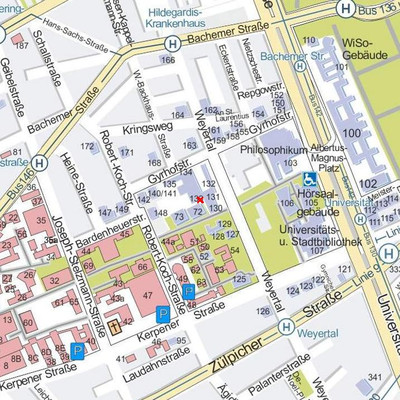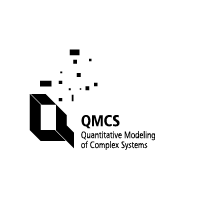The Cologne Summer School: Non-Linear Methods for Complex Systems Analysis has been a huge success. Thanks to all participants!
Monday to Friday, September 28th - October 2nd, 2015
Information
The Competence Area 3: Quantitative Modeling of Complex Systems of the University of Cologne hosts a summer school to introduce novel and groundbreaking methods for the analysis of scientific data. For this matter, we bring together master's degree and PhD students from the University of Cologne and from international universities for an interdisciplinary learning experience. The aim of the summer school is not only to teach new analysis methods, but also to foster scientific collaboration and discussion between students of different fields of study.
This year, the summer school of the Competence Area 3 will introduce non-linear analysis methods to study highly complex systems, which cannot be sufficiently characterized with linear methods. Such systems are frequently encountered, e.g., in biology, chemistry, economics, geoscience, neuroscience, and physics. The one-week summer school will take place from Monday to Friday, September 28 - October 2, at the University of Cologne, Germany. The strongly interdisciplinary hands-on course consists of lectures and computer labs and will provide the students with novel analysis techniques and concepts. Amongst others, the workshop will cover topics such as detrended fluctuation analysis, complex networks, scaling analysis, synchronization, transfer entropy, and causality, which help to characterize systems that are governed by non-linear processes.
The summer school is led by Dr. Reik Donner and Marc Wiedermann from the Potsdam Institute of Climate Impact Research based on their lectures at the Humboldt University, Berlin, and their popular short-courses at the European Geosciences Union General Assembly. They will introduce the Python toolbox pyunicorn for non-linear analysis along with prominent examples of modern analysis frameworks highlighting the methodological variety of complex systems based data analysis (see program below). The techniques that are taught in the summer school will be illustrated by applications to real-world data from different fields of study.
The course materials will be made available to the participants after the course, including example codes for the platform-independent open-source software Python and the toolbox pyunicorn. The course will be held in English.
For questions, please contact Mitch von Papen (vonpapen@geo.uni-koeln.de).
Program
The summer school consists of approximately the same amount of lectures and computer labs. During the lectures, the basics of the analysis methods are explained. Subsequently, these methods are applied to synthetic and real-world data in computer labs. The students work on a project in small groups and present and discuss their results at the end of the workshop.
The students are introduced to the concepts of several non-linear analysis methods and will gain experience in applying the toolbox pyunicorn as well as in interpreting the results. Ideally, the summer school will enable the students to use the learned techniques on their own scientific data after the summer school. The approximate schedule for the summer school is given below. Note however, that changes may occur due to group dynamics.
Monday, September 28th
09:00 a.m. | Registration and Welcome
09:30 a.m. | Lecture 1: Introduction - linear vs. non-linear methods, Stationarity, uni- and multivariate correlation analysis, classical early warning methods, non-linearity tests and surrogate data
10:30 a.m. | Coffee break
11:00 a.m. | Lecture 2: Long-range dependence and scaling analysis, Persistence and anti-persistence, power spectrum, Hurst exponent, detrended fluctuation analysis
12:30 p.m. | Lunch break
02:00 p.m. | Tutorial 1: Introduction to Python, Why Python in science?, important packages for scientific computing, common data types, structure of pyunicorn
03:30 p.m. | Coffee break
04:00 p.m. | Tutorial 2: Assignment of group projects, (5 groups a 5 persons)
05:30 p.m. | End of day 1
06:30 p.m. | Social get-together at local brewery
Tuesday, September 29th
09:00 a.m. | Lecture 3: Introduction to complex networks, Mathematical representation of networks, structural network characteristics, basic network models, identification of power-laws, interconnected and multi-layer networks
10:30 a.m. | Coffee break
11:00 a.m. | Lecture 4: Inferring networks from data, Functional network analysis (correlation networks, examples from climatology, neurophysiology and economics), visibility graphs
12:30 p.m. | Lunch break
02:00 p.m. | Tutorial 3: tbd
03:30 p.m. | Coffee break
04:00 p.m. | Tutorial 4: tbd
05:30 p.m. | End of day 2
Wednesday, September 30th
09:00 a.m. | Lecture 5: Information theory and entropy, Basic concepts, Shannon-, Renyi- and Tsallis-entropies as statistical quantifiers, Kolmogorov-Sinai (source) entropy and estimation via block entropies, order patterns and permutation entropy, mutual information, transfer entropy and causality, independent component analysis
10:30 a.m. | Coffee break
11:00 a.m. | Lecture 6: Synchronization, Definition and types of synchronization, phase synchronization: order parameters and phase dynamics from data, generalized synchronization
12:30 p.m. | Lunch break
02:00 p.m. | Tutorial 5: tbd
03:30 p.m. | Coffee break
04:00 p.m. | Tutorial 6: tbd
05:30 p.m. | End of day 3
Thursday, October 1st
09:00 a.m. | Lecture 7: Phase space concepts, Phase space of dynamical systems, embedding, fractal dimensions, correlation integral and relation with entropies, entropy estimates from embedded data
10:30 a.m. | Coffee break
11:00 a.m. | Lecture 8: Recurrence analysis, Recurrence in phase space; recurrence plots, quantification analysis and networks; multivariate generalizations; applications: synchronization analysis, coupling direction
12:30 p.m. | Lunch break
02:00 p.m. | Tutorial 7: tbd
03:30 p.m. | Coffee break
04:00 p.m. | Tutorial 8: tbd
05:30 p.m. | End of day 4
Friday, October 2nd
09:00 a.m. | Presentation and discussion of projects 1-3 from the tutorials
10:30 a.m. | Coffee break
11:00 a.m. | Presentation and discussion of projects 4-6 from the tutorials
12:30 p.m. | Lunch break
02:00 p.m. | Open discussion: Outlook on contemporary developments in the field
03:30 p.m. | End of day 5: Farewell
Location
The location of the summer school has changed: the summer school will now take place in the PC-Pool (Kursraum) 3 of the Computation Center (RRZK) of the University of Cologne marked by a red cross in the picture below. There are 25 ready installed PC work stations, which will be used for the practical parts of the course. You will not be working on your own notebook!

Qualifications
To successfully take part in the summer school, students should be familiar with linear time series analysis methods and basic statistics (auto/cross correlation, Fourier spectra, probability density function, statistical moments, etc.). The students should also have experience in UNIX systems and at least one programming language. Basic knowledge of Python is an advantage but is not required.
Costs
The application fee for taking part in the summer school is 60 EUR. The fee is to be paid after we send you a confirmation email of your successful application. Please note that banking fees may arise for international money transfers. Apart from the training course itself, the summer school fee includes snacks and drinks during the short breaks and a meal plus drink at the social get-together at a local brewery on Monday evening. Here, you can get to know your summer school fellows and lecturers.
Any additional costs - e.g. for accomodation, travel, meals etc. - are not covered and must be paid for by the participant. Please make your own arrangements. Low-priced meals are available at the University Mensa close to the location of the summer school, for which guest passes will be provided. For information on accomodation, see below.
Accomodation
Cologne offers various possibilities for affordable accomodation ranging from around 25 EUR/night (hostel) to around 70 EUR/night (hotel). You can look for a nice place to stay, e.g., at http://www.cologne-tourism.com/hotels or on Google Maps.
For questions, please contact Mitch von Papen (vonpapen@geo.uni-koeln.de).
Organization
- <div id="orga"></div>Prof. Dr. Joachim Saur (Speaker of the Competence Area 3, Institute of Geophysics)
- Dr. <a href:"mailto:vonpapen@uni-koeln.de?subject=Cologne Summer School: Question">Michael von Papen</a> (vonpapen@geo.uni-koeln.de, Coordinator of CA3)
- International Office of the University of Cologne
btw: The picture in our poster and flyer show the topology of the internet, namely the round trip time of a data packet. For more information see: http://www.caida.org/research/performance/rtt/walrus0202/
